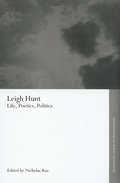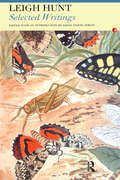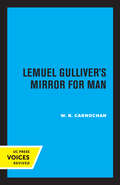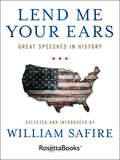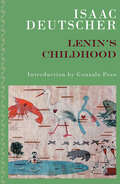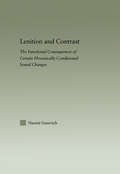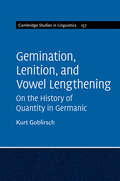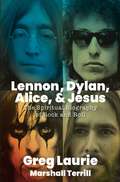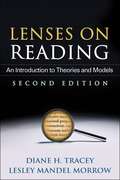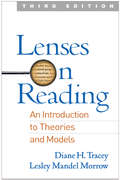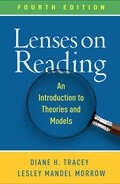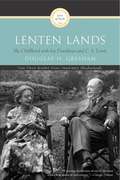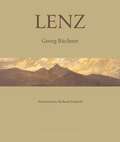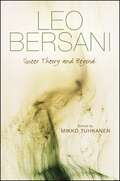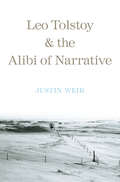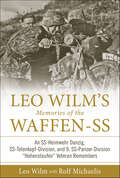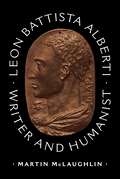- Table View
- List View
Leigh Hunt: Life, Poetics, Politics (Routledge Studies in Romanticism)
by Nicholas RoeRecent critical and scholarly interest in John Keats has encouraged a resurgence of interest in his friend and mentor, the poet and journalist Leigh Hunt. This timely collection of essays by leading British and North America romanticists explores Hunt's life, writings and cultural significance over the full length of his career, arguing for the recognition of Hunt's importance to British intellectual and literary culture in the Romantic period.
Leigh Hunt: Selected Writings (Fyfield Bks.)
by Leigh HuntFirst published in 2004. Routledge is an imprint of Taylor & Francis, an informa company.
Lemuel Gulliver's Mirror for Man
by W. B. CarnochanSatire, long the most neglected of literary genres, has begun to claim its share of critical attention. And no book in the satiric tradition has generated more controversy that Gulliver's Travels; since it was first published it has been the subject of an often passionate debate about its moral and esthetic value--a debate inseparable from the question of what Swift was really saying about us all, especially in Book IV. Despite the running controversy, this is the first extended study of the Travels to appear in over forty years. It places Swift's masterpiece in the perspective of its own age, but also in relation to ours. First it reviews the philosophical doubts of the Augustans about the nature of man--doubts now recognized as a major force behind Swift's satire. It examines Augustan satiric theory and its Continental background; and, coming to the Travels, treats them as one instance of a conventional form, the "satire on man." On the vexed problem of Book IV it argues that alternative views of Swift as a savage misanthrope and as a benign humanist are both inadequate, and that as in Swift's irony generally, what seem to be contradictory truths are simultaneously in force. The study is concerned throughout with the way values operate in a satiric context. What, for example are we to make of Gulliver's pious attachment to "truth"-telling? In this connection, a speculative theory is proposed which relates Swift's satiric intentions to the epistemology of John Locke. Finally, an epilogue looks ahead to some modern writers--Lewis Carroll, Joyce, Vladimir Nabokov--whose habits throw a retrospective light on Swift's. The study, broadly speaking, is not only about Gulliver's Travels but also about the psychology of the satirist and about the mind's response, whether the Augustans' or our own, at moments of intellectual crisis. This title is part of UC Press's Voices Revived program, which commemorates University of California Press's mission to seek out and cultivate the brightest minds and give them voice, reach, and impact. Drawing on a backlist dating to 1893, Voices Revived makes high-quality, peer-reviewed scholarship accessible once again using print-on-demand technology. This title was originally published in 1968.
Lend Me Your Ears: Great Speeches in History
by William SafireFrom a Pulitzer Prize–winning author, this collection of speeches is &“the most valuable kind of book, the kind that benefits mind and heart&” (Peggy Noonan). This third edition of the bestselling collection of classic and modern oratory offers numerous examples of the greatest speeches ever delivered—from the ancient world to the modern. Speeches in Lend Me Your Ears span a broad stretch of history, from Gen. George Patton inspiring Allied troops on the eve of D-Day to Pericles&’s impassioned eulogy for fallen Greek soldiers during the Peloponnesian War; and from Jesus of Nazareth&’s greatest sermons to Ruth Bader Ginsburg&’s fiery speech in response to the Bush vs. Gore decision that changed the landscape of American politics in our time. Editor William Safire has collected a diverse range of speeches from both ancient and modern times, from people of many different backgrounds and political affiliations, and from people on both sides of history&’s greatest battles and events. This book provides a wealth of valuable examples of great oratory for writers, speakers, and history aficionados.
Lengua, ritmo y cultura [Grado] 1
by Luis A. Rosado Laura Machuca Silvia Alvarado-Bolek Rosario Sepúlveda Lidia MorrisNIMAC-sourced textbook
Lengua, ritmo y cultura [Grado] 1, Cuaderno de prácticas
by Luis A. Rosado Laura Machuca Silvia Alvarado-Bolek Rosario SepúlvedaNIMAC-sourced textbook
Lengua, ritmo y cultura [Grado] 4
by Luis A. Rosado Laura Machuca Silvia Alvarado-Bolek Rosario Sepúlveda Lidia MorrisNIMAC-sourced textbook
Lengua, ritmo y cultura [Grado] 4, Cuaderno de prácticas
by Luis A. Rosado Laura Machuca Silvia Alvarado-Bolek Rosario SepúlvedaNIMAC-sourced textbook
Lengua, ritmo y cultura [Grado] 5
by Luis A. Rosado Laura Machuca Silvia Alvarado-Bolek Rosario Sepúlveda Lidia MorrisNIMAC-sourced textbook
Lengua, ritmo y cultura [Grado] 5, Cuaderno de prácticas
by Luis A. Rosado Laura Machuca Silvia Alvarado-Bolek Rosario SepúlvedaNIMAC-sourced textbook
Lengua, ritmo y cultura [Grado] K
by Luis A. Rosado Laura Machuca Silvia Alvarado-Bolek Rosario Sepúlveda Lidia MorrisNIMAC-sourced textbook
Lengua, ritmo y cultura [Grado] K, Cuaderno de prácticas
by Luis A. Rosado Laura Machuca Silvia Alvarado-Bolek Rosario SepúlvedaNIMAC-sourced textbook
Lenin's Childhood
by Isaac DeutscherWhen he died suddenly in 1967, Isaac Deutscher had completed only the compelling first chapter of a long-anticipated biography of Lenin, published here. It covers Lenin&’s family background, birth and early years in the backwater town of Simbirsk up to the execution of his brother, a traumatic formative event. Drawing on a lifetime of background research, including access to the closed section of Trotsky&’s archives, Lenin&’s Childhood gives a novel interpretation of the earliest influences on Lenin&’s personality and thinking. Most of all, it is a glimpse into an unfinished work which would have striven to save Lenin from fanatical anti-revolutionary condemnation and, perhaps more important, from uncritical communist beatification.This anniversary edition includes an introduction by Deutscher's biographer, Gonzalo Pozo, which situates the Lenin project within Deutscher&’s oeuvre and discusses the sources, influences and evolution of his never completed life of Lenin.
Lenition and Contrast: The Functional Consequences of Certain Phonetically Conditioned Sound Changes (Outstanding Dissertations in Linguistics)
by Naomi GurevichThis book analyzes 153 languages from a large variety of families to establish a previously unexplored relationship between phonetically conditioned sound changes such as lenitions and functional (meaning maintenance related) considerations. Carefully collecting numerous inventories of consonants, this collection is likely to become an important resource for future linguistics research. By distinguishing between phonetic and phonological neutralization, and showing that the first does not necessarily result in the second, Naomi Gurevich uncovers previously unexplored and often surprising trends in the relationship between phonetics and phonology.
Lenition and Vowel Lengthening in the Germanic Languages: On the History of Quantity in Germanic (Cambridge Studies in Linguistics #157)
by Kurt GoblirschThe processes of gemination, lenition, and vowel lengthening are central to the study of phonology, as they reveal much about the treatment of quantity in a given language.<P><P> Using data from older language stages, modern dialects and standard languages, this study examines the interdependence of vowel and consonant quantity in the history of the Germanic branch of Indo-European. <P>Kurt Goblirsch focusses on the various geminations in Old Germanic languages (West Germanic gemination, glide strengthening, and expressive gemination), open syllable lengthening in German, Dutch, Frisian, English, and Scandinavian languages, and the major lenitions in High German, Low German, and Danish, as well as minor lenitions in Bavarian, Franconian, and Frisian dialects. All of these changes are related to the development of the Germanic languages from distinctive segmental length to complementary length to syllable cut. The discussion challenges traditional theoretical assumptions about quantity change in Germanic languages to argue for a new account whereby, gemination, lenition, and vowel lengthening are interrelated.<P> Uses extensive linguistic data, including examples from historical texts, modern dialects, and the standard Germanic languages.<P> Accessible to linguists in fields other than Germanic, providing chapter summaries and English glosses of all examples for non-specialists.<P> Highly comparative, and presents a broader Germanic picture for English, German and Scandinavian specialists.
Lennon, Dylan, Alice, and Jesus: The Spiritual Biography of Rock and Roll
by Greg LaurieA nationally best-selling author and pastor draws lessons of hope and transformation in the perils of excess, the agonies of repentance, and the wonder of redemption found in the life stories of several icons of pop music and rock and roll. From the author of Johnny Cash: The Redemption of an American Icon and Steve McQueen: The Salvation of an American Icon comes Lennon, Dylan, Alice, and Jesus, which traces the journeys, rise, fall, and sometimes the redemption of famous entertainers who were brought to their knees—a great place to look up and finally meet their Maker. Lennon, Dylan, Alice, and Jesus examines wretched excess, self-absorption and miraculous redemption; the book is a raw, sensitive, and unforgettable journey of sex, drugs, rock and roll, and sweet salvation. Author Greg Laurie traces the lives of rock stars and entertainment figures and legends who wallowed in the decadence of both the high life and low life, as they alternately experienced Heaven and Hell on Earth. He travels with them into their demonic abysses and joyfully chronicles their ultimate ascension to their prodigal moments. Lennon, Dylan, Alice, and Jesus chronicles the birth of rock and roll in the mid-1950s to today, giving the book an all-encompassing study of pop music history. Through his personal memories, coupled with his carefully crafted observational research, Greg Laurie not only looks deeply into the hearts and souls of these unusual people but bids the reader to join him on a spiritual journey down the secluded halls of the music industry with the individuals who crafted modern-day masterpieces. Readers will enjoy never-before-published accounts of the biggest recording artists of our time and hear testimonies from rockers of the 1950s, 1960s, 1970s, 1980s, 1990s, 2000s, and beyond. More importantly, every reader will find a deeper sense of God&’s presence, even in times of loneliness and desolation.
Lenses on Reading, Second Edition
by Diane H. Tracey Lesley Mandel MorrowThis widely adopted text explores key theories and models that frame reading instruction and research. Readers learn why theory matters in designing and implementing high-quality instruction and research; how to critically evaluate the assumptions and beliefs that guide their own work; and what can be gained by looking at reading through multiple theoretical lenses. For each theoretical model, classroom applications are brought to life with engaging vignettes and teacher reflections. Research applications are discussed and illustrated with descriptions of exemplary studies. New to This Edition Current developments in theory, research, and instructional practices. Useful pedagogical features in every chapter framing questions, discussion ideas, and learning activities. Classroom applications give increased attention to English language learners and technology integration. Coverage of additional theories (Third Space Theory) and theorists (Bakhtin and Bourdieu).
Lenses on Reading, Third Edition: An Introduction to Theories and Models
by Diane H. Tracey Lesley Mandel MorrowWidely adopted as an ideal introduction to the major models of reading, this text guides students to understand and facilitate children's literacy development. Coverage encompasses the full range of theories that have informed reading instruction and research, from classical thinking to cutting-edge cognitive, social learning, physiological, and affective perspectives. Readers learn how theory shapes instructional decision making and how to critically evaluate the assumptions and beliefs that underlie their own teaching. Pedagogical features include framing and discussion questions, learning activities, teacher anecdotes, classroom applications, and examples of research studies grounded in each approach. New to This Edition *Chapter on physiological foundations of reading development, including the impact of nutrition, sleep, and exercise. *Chapter on affective/emotional perspectives, such as the role of engagement and teacher-student relationships. *Additional social learning perspectives: Critical Race Theory and Multiliteracies Theory. *All chapters updated with the latest research; many new teacher anecdotes added.
Lenses on Reading: An Introduction to Theories and Models
by Diane H. Tracey Lesley Mandel MorrowNow in a revised and updated fourth edition incorporating current advances in research and instructional practices, this well-established text accessibly introduces prominent theories and models related to reading. The book is organized chronologically, from classical approaches to contemporary cognitive, social learning, physiological, and affective perspectives. It emphasizes that the more lenses educators possess for examining reading processes, the better equipped they will be to understand and facilitate children's literacy development. Pedagogical features include framing and discussion questions, learning activities, teacher anecdotes, and examples of how each model is applied in classroom practice and research. New to This Edition *Chapter on digital literacy. *Expanded discussions of direct/explicit instruction, social and emotional learning, critical literacy theory, critical race theory, culturally responsive teaching, social equity and justice, the science of reading, and neuroscientific lenses. *All chapters updated with the latest research; many new classroom anecdotes added. *Links to recommended YouTube videos illustrating the theories and models.
Lenten Lands
by Douglas GreshamDouglas Gresham's experiences growing up as C. S. Lewis's stepson; born in America, going to England at age eight, and dealing with his mother's, and stepfather's, deaths. Includes an afterword, added in 2003.
Lenz
by Richard Sieburth Georg BuchnerLenz, Georg Büchner's visionary exploration of an 18th-century playwright's descent into madness, has been called the inception of European modernist prose. Elias Canetti considered this short novella one of the decisive reading experiences of his life, and writers as various as Paul Celan, Christa Wolff, Peter Schneider, and Gert Hofmann have paid homage to it in their works. Published posthumously in 1839, Lenz provides a taut case study of three weeks in the life of schizophrenic, perhaps the first third-person text ever to be written from the "inside" of insanity. An early experiment in docufiction, Büchner's textual montage draws on the diary of J.F. Oberlin, the Alsatian pastor who briefly took care of Lenz in 1778, while also refracting Goethe's memoir of his troubled friendship with the playwright -- English versions of both of these historical source texts here accompany Lenz for the first time in this bilingual presentation. Based on the best recent edition of the text, this fresh translation will allow readers to discover why Heiner Müller pronounced Lenz the inaugural example of "21st-century prose."
Leo Bersani: Queer Theory and Beyond
by Mikko TuhkanenFor more than fifty years, Leo Bersani's writing has inspired and challenged scholars in the fields of literary criticism and theory, cultural studies, queer theory, psychoanalysis, and film and visual studies. This is the first book-length collection on this important author. The book's extensive introduction outlines in detail Bersani's oeuvre, particularly its place in queer thought and his complicated relationships with the fields of queer theory and psychoanalysis. The subsequent contributions by notable scholars in various fields demonstrate the richness and open-endedness of his work. The book concludes with a new interview with Bersani.
Leo Tolstoy and the Alibi of Narrative
by Justin WeirOne hundred years after his death, Tolstoy still inspires controversy with his notoriously complex narrative strategies. This original book explores how and why Tolstoy has mystified interpreters and offers a new look at his most famous works of fiction.
Leo Wilm's Memories of the Waffen-SS: An SS-Heimwehr Danzig, SS-Totenkopf-Division, and 9. SS-Panzer-Division “Hohenstaufen” Veteran Remembers
by Rolf Michaelis Leo WilmA firsthand account of Leo Wilm&’s six years at war in the Waffen-SS
Leon Battista Alberti: Writer and Humanist
by Martin McLaughlinThe first book in English to examine Leon Battista Alberti&’s major literary works in Latin and Italian, which are often overshadowed by his achievements in architectureLeon Battista Alberti (1404–1472) was one of the most prolific and original writers of the Italian Renaissance—a fact often eclipsed by his more celebrated achievements as an art theorist and architect, and by Jacob Burckhardt&’s mythologizing of Alberti as a "Renaissance or Universal Man." In this book, Martin McLaughlin counters this partial perspective on Alberti, considering him more broadly as a writer dedicated to literature and humanism, a major protagonist and experimentalist in the literary scene of early Renaissance Italy. McLaughlin, a noted authority on Alberti, examines all of Alberti&’s major works in Latin and the Italian vernacular and analyzes his vast knowledge of classical texts and culture.McLaughlin begins with what we know of Alberti&’s life, comparing the facts laid out in Alberti&’s autobiography with the myth created in the nineteenth century by Burckhardt, before moving on to his extraordinarily wide knowledge of classical texts. He then turns to Alberti&’s works, tracing his development as a writer through texts that range from an early comedy in Latin successfully passed off as the work of a fictitious ancient author to later philosophical dialogues written in the Italian vernacular (a revolutionary choice at the time); humorous works in Latin, including the first novel in that language since antiquity; and the famous treatises on painting and architecture. McLaughlin also examines the astonishing range of Alberti's ancient sources and how this reading influenced his writing; what the humanist read, he argues, often explains what he wrote, and what he wrote reflected his relentless industry and pursuit of originality.
